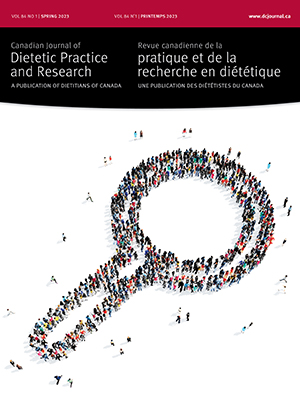Volume 63 • Number 1 • March 2002
Chair’s Message
Editor’s Message
Research
Diet interventions for dyslipidemia can produce clinically relevant changes in lipoprotein levels. To determine whether current nutrition counselling practices are consistent with such interventions, we studied aspects of Canadian dietitians’ practice. Respondents to a self-administered mail survey (n=350) described practice for three groups of clients: those without and those with cardiovascular disease counselled through ambulatory care, and those with cardiovascular disease who were hospitalized. The process-of-care factors assessed were time spent in initial and follow-up sessions, diet, anthropometry, blood lipids, physical activity, and social and genetic factors. Organization factors assessed included availability of medical history and laboratory data, and perceived support for counselling services. Initial individual interview times averaged one hour, with 49% to 57% of respondents offering scheduled follow-up services versus passive or no followup services. Overall, counselling practices were consistent with efficacious interventions, but there was wide variation. This was particularly evident in ambulatory care, where higher percentages of clients received follow-up care when respondents reported multidisciplinary group practice; better access to the medical history, and more frequent assessment of measured body weight, client social support, and laboratory data during follow-up care (all p<0.01). Health care effectiveness may be improved through changes in the process and organization of services.
Review
Insulin resistance is a prevalent condition, in which insulin loses its normal physiological action. Since people were first classified as insulin resistant over 60 years ago, one of the main discoveries has been that insulin resistance clusters with other risk factors such as obesity, elevated triglycerides, and low high-density lipoprotein cholesterol, increasing cardiovascular disease risk. Although insulin resistance appears to manifest first in the periphery and then in the liver, other sites, such as the brain and the pancreatic β-cell, may play pathogenic roles. Factors contributing to insulin resistance at these sites include perturbations in free fatty acids, glucose, and hormone-signalling, some of which may be linked to various genetic polymorphisms. Appropriate nutritional treatment for insulin resistance is controversial. Two main approaches are drawn from diabetes recommendations: i) a high-carbohydrate, low-fat, highfibre diet emphasizing low glycemic-index foods and ii) sharing calories between monounsaturated fat and complex carbohydrate at the expense of saturated fat. Recent interest in insulin resistance has prompted the development of new guidelines. Promising data have also emerged, showing that a high-carbohydrate, high-fibre, low-fat diet plus exercise programs maintained through intensive counselling can decrease diabetes risk by over 40%. Additional research is required to confirm the sustainability of this approach and sort out the determinants of insulin resistance so that more effective nutritional interventions will result.










